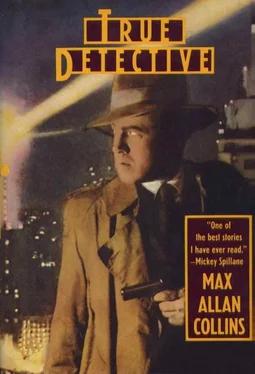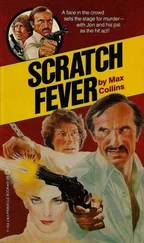We sat there silently, each of us having a couple of swigs at his beer.
Finally I said, “This is good beer.”
The smile turned into a grin, and the grin seemed more real. “It beats that piss Capone bottles and calls beer, by a hundert miles,” he said.
“There’s no label.”
“It’s Roger Touhy’s beer. The beer he bottles isn’t for sale. It’s for friendship. The beer he sells, he sells by the barrel, to the roadhouses, saloons, and such. All outside of Chicago.”
Roger Touhy was a bootlegger in the northwest suburbs; the sort of safe, minor-league gangster Cermak could control.
“Well, it’s the best beer in or out of town,” I said.
Cermak nodded, his smile gone, his expression thoughtful. “It’s the water, you know.”
“Pardon?”
“They got an artesian well near Roselle. The finest, purest water. That’s Touhy’s secret.”
We sat and drank for a while. Periodically, Cermak would seem to wince or something; put a hand on his stomach.
“And how is your uncle Louis?” Cermak said, putting the half-empty bottle of Touhy beer on the marble-top. “I understand he had kidney stones.”
“Why, uh, yes,” I said, startled that Cermak had remembered me and my connection to my uncle, “that’s right. But he’s, uh, he’s over it, I think.”
Cermak shook his head gravely. “You never get over that. I had ’em, you know. Goddamn stones, if you pass ’em, it’s like pissing glass.”
I suddenly realized that Cermak didn’t remember me, or that particular piece of patronage; he just had done his homework.
He offered me another beer and I turned it down: I’d already had three or four at Barney’s, and I was feeling the effect. This guy was too cute, too cunning to deal with tipsy.
“I suppose I should get to the point,” he said. “You’re a busy man. I don’t want to waste your time.”
He said this quite ingenuously, as if he didn’t sense the irony of the mayor of Chicago not wanting to waste one of his cop’s time. One of his ex -cops, at that.
“I want you to take this back,” he said, and he reached a hand out behind him and Miller came over and reached in an inside jacket pocket and withdrew something and filled Cermak’s hand with it. Cermak showed me what it was. My badge.
“I can’t do that,” I said.
Cermak didn’t hear that, apparently.
“What I have in mind,” he said, putting the badge on the marble-top, “is you joining one of my hoodlum squads. We’ve got the world’s fair coming up, you know, and I’ve got some promises to keep. And I keep my promises, Nate. Can I call you Nate?”
“Sure,” I shrugged.
Cermak took a swig of the beer and said, “I’ll have no truck with lawlessness, Nate. I promised Chicago I’d run these gangsters out of town, and by damn I’m going to do it. I won’t have ’em working their shady games at the fair.”
I nodded.
“Yesterday is an example of what we need to do, where these hoodlums are concerned. You — like Sergeants Miller and Lang, and some of my other top people — will be sworn in as a deputy coroner so you can go all over Cook County picking up these gangsters.”
“Your Honor,” I said, “I killed somebody yesterday. That isn’t my idea of how to do anything .”
He rose; his face got very red. And then he exploded.
“It’s a war! It’s a goddamn war! Don’t you know that? I’m giving you an opportunity that any cop in town, every cop in town, would give his left ball for, and you — you”
He touched his stomach with the flat of one hand; he squinted.
“Excuse me,” he said, and left the room.
I could hear Paul Whiteman again, faintly. Over by the window, Miller, looking out at Grant Park, said, “You better listen to the mayor.”
I didn’t say anything.
There was another flush, and Cermak came back in; he didn’t roll in this time. He seemed old. He was only in his late fifties, but he seemed old.
He sat. “I made some campaign promises. I said I’d salvage Chicago’s reputation. I said I’d drive the gangsters out. I told important people in this town that the town would be safe for a world’s fair. A fair that could restore Chicago’s dignity. Her reputation.”
“Do you really think Chicago’s reputation was enhanced by what happened yesterday?” I said.
He seemed to think about that. “We were shown to be courageous.”
“Some people say it was real police behind the guns at the Saint Valentine’s Day Massacre, too, you know.”
He glared at me; it was like an oven door opening and the heat hitting you in the face. “What the hell is that supposed to mean?”
“It simply means,” I said, trying to drain all the smart-ass out of me, “that headline-making violence adds to the city’s bloody reputation no matter who is pulling the triggers.”
He touched his hands together lightly, prayerlike. “Suppose yesterday had gone differently. Suppose that young man had not been in the window. Suppose the only person to die in that room had been Frank Nitti. A message would’ve been sent. To the gangsters. To the public. That this administration is not fooling around.”
“Somebody did die, and it wasn’t Frank Nitti. That’s the bad part, isn’t it, Your Honor. The public sees a shoot-out involving police, and several people are shot, but the big fish gets away. Oh, Nitti took a fall, all right — only he’s going to get up again. Nitti’s going to live.”
Cermak nodded, suddenly lost in thought. “Yes,” he said. “I believe you’re right...” There was a pause the word “unfortunately” might have filled. “... and while the world would be a better place without Mr. Nitti, we’re not murderers, after all. He did shoot Sergeant Lang, and Sergeant Lang returned fire, and that’s the end of it.”
I glanced over at Miller. He didn’t seem to be listening; he was still looking out at the park.
“Could we speak in private, Your Honor?” I asked.
Without turning, Cermak said, “Sergeant Miller... you and Mulaney go and have a smoke in the hall.”
Miller shambled by, without looking at me; Mulaney followed him out, or anyway the oversize suit he was wearing did, taking him along.
When the door had closed behind them, I said, “Are you really aware of what happened at the Wacker-LaSalle Building yesterday?”
“Suppose you tell me, Nate.”
I did.
He listened with a rather glassy, frozen smile, and when I finished, he said, “It’s a funny thing, Nate. You can have a dozen witnesses to an event, to an accident, a crime, and you can end up with a dozen damn versions of it. It’s human nature. Take the Lingle case.” And here he paused and broadened his smile momentarily, as if to say, You remember the Lingle case, don’t you, Nate? Then he picked my badge up from the marble-top, looked at it, tossed it on the sofa next to me. “You’ll be a sergeant for a while, and a lieutenant by next year this time. Sergeant’s pay is twenty-nine hundred dollars, but you’ll get deputy coroner’s pay, which is three thousand sixty. Lieutenant’s is thirty-two hundred. That’s a thousand-dollar raise for you, isn’t it, Nate?”
Cermak talked about that extra grand like he wasn’t a millionaire, like it meant something to him; or maybe that’s why he was a millionaire: because a grand did mean something to him. Like it did to me.
“And the salary isn’t everything,” he continued, with an offhand gesture, a little smile, a shrug. “There are extras. I don’t have to be specific, do I, Nate?”
“You don’t have to be specific,” I said.
He sat and stared at me and smiled at me and it was like having a shotgun smile at you and I finally had to look away.
Читать дальше












